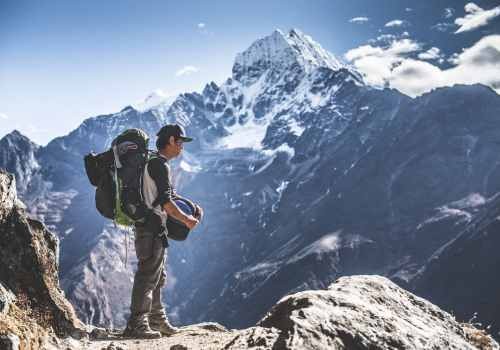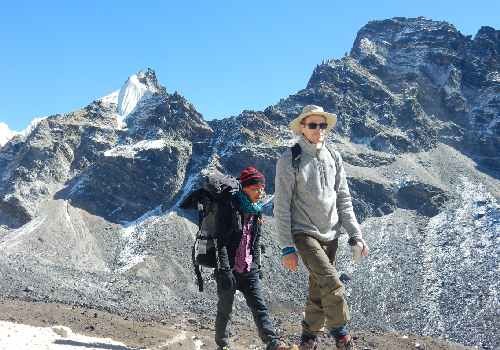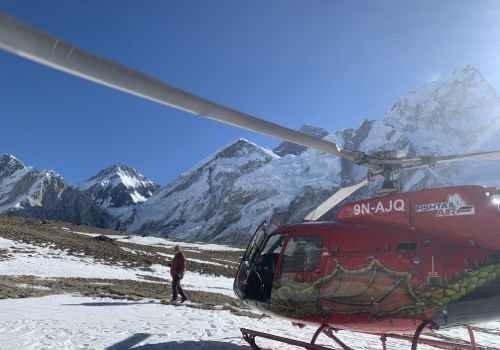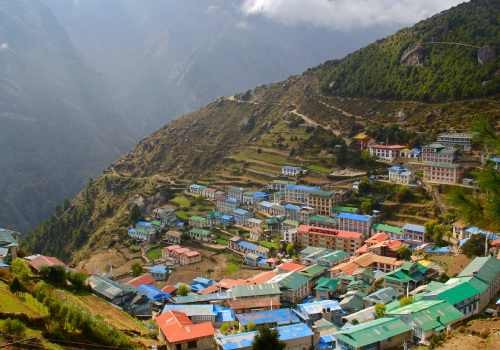Physical Preparation for the Everest Base Camp Trek – Let’s Have a Look in This Topic.
The Everest Base Camp Trek is a challenging journey that requires a certain level of fitness. Trekking planner Inc. recommends that trekkers start a physical training routine at least six months before the trek to build endurance and strength. Cardiovascular exercises such as running, cycling, and swimming are highly recommended to build stamina. Strength training exercises such as squats, lunges, and push-ups are also important to build the necessary muscle strength required for the trek.
It is also important to acclimatize your body to the high altitude. Trekkers should consider spending a few days in a high-altitude location before embarking on the trek. This allows the body to adjust to the reduced oxygen levels at high altitudes. As you ascend during the trek, make sure to take it slow and steady to avoid altitude sickness.
Finally, make sure to consult with your doctor before embarking on the trek to ensure that you are physically fit to undertake this challenging journey.
What to Pack for the Everest Base Camp Trek.
Packing for the Everest Base Camp Trek can be a daunting task. It is important to pack light and only carry the essentials. A good quality backpack with a capacity of at least 50 liters is recommended to carry your gear. Make sure to pack warm clothes, including a down jacket, thermal underwear, gloves, and a hat. Trekking boots with good ankle support are also essential.
Other things to pack include a sleeping bag, a headlamp, a water bottle, and a first aid kit. It is also important to pack some snacks and energy bars for the long trekking days. Make sure to pack all your gear in waterproof bags to protect them from the rain.
Trekking planner Inc. recommend to contact the senior representatives for additional supports related to packing and required equipment’s and gears for the Everest Base Camp Trekking.
Accommodation and Facilities available on the Everest Base Camp Trek.
Accommodation on the Everest Base Camp Trek is basic but comfortable. Most lodges offer shared rooms with twin beds and shared bathrooms. The lodges are clean and well-maintained, but do not expect luxury facilities.
The lodges also offer meals, including breakfast, lunch, and dinner. The meals are simple but nutritious and include local dishes such as dal Bhat and momos. Trekkers should also carry some snacks and energy bars for the long trekking days.
Most lodges also offer facilities such as hot showers and charging points for electronic devices. However, trekkers should be prepared to pay extra for these facilities.
The Route and Daily Itinerary for trekking the Everest Base Camp.
The Everest Base Camp Trek is a 11–14 Days trek that covers a distance of approximately 130 km. The trek starts from Lukla, a small town in the Khumbu Region, and ends at the Everest Base Camp if you take a Heli ride back or ends at Lukla if you trek down towards Lukla and take a flight to Kathmandu.
The daily itinerary of the trek involves trekking for 5-6 hours, covering a distance of 10-15 km. The trek is challenging and involves ascending and descending steep trails. The trek also involves crossing suspension bridges and walking on narrow paths carved into the mountain.
Trekkers will also have the opportunity to visit local villages and monasteries along the way, offering a glimpse into the local culture and way of life.
Outline itinerary.
- Day 1: Arrival in Kathmandu (1,300m/4,265ft).
- Day 2: Fly from Kathmandu (1,295m/4,259ft) to Lukla (2,845m/9,333ft) 35 min and trek to Phakding (2,610m/8,562ft) 3-4 hrs. walk.
- Day 3: Trek from Phakding (2,610m/8,562) to Namche (3440 m/11,285ft) 5-6 hrs. walk.
- Day 4: Namche Bazaar-acclimatization and exploration day.
- Day 5: Trek from Namche Bazaar (3,440m/11,285ft) to Tengboche (3,870m/12,467ft) about 5 hrs. walk.
- Day 6: Trek from Tengboche (3,870m/12,696ft) - Dingboche (4,410m/14,467ft).
- Day 7: Acclimatization and Exploration Day at Dingboche.
- Day 8: Trek from Dingboche (4,410m/14,467ft) – Lobuche (4,910m/16,108ft).
- Day 9: Trek from Lobuche (4,910m/16,108ft) to Gorakshep (5,160m/16,928ft) 3 hrs. walk to Everest base camp (5,364m/17,597ft) to Gorakshep- 4 to 5 hrs. walk.
- Day 10: Trek from Gorakshep (5,160m/16,928ft) to Kala Patthar (5,550m/18,207ft) 2 hrs. 30 min to Pheriche (4,230m/13,877ft) about 5 hrs. walk.
- Day 11: Trek from Pheriche(4,23m/13,877ft) to Namche Bazaar (3,440 m/11,285ft) about 6 hrs. walk.
- Day 12: Trek from Namche (3440 m/11,285ft) to Lukla (2,845m/9,333ft).
- Day 13: Fly from Lukla (2,845m/9,333ft) to Kathmandu (1,300m/4,265ft).
- Day 14: Final Departure.
Altitude Sickness and How to Avoid It during Everest Base Camp Trekking.
Altitude sickness is a common problem faced by trekkers on the Everest Base Camp Trek. It is caused by the reduced oxygen levels at high altitudes and can lead to symptoms such as headaches, nausea, and dizziness.
To avoid altitude sickness, it is important to acclimatize your body to the high altitude. This involves ascending slowly and taking regular breaks to allow your body to adjust to the reduced oxygen levels. It is also important to stay hydrated and avoid alcohol and smoking.
In case of severe altitude sickness, it is recommended to descend to a lower altitude immediately and seek medical attention.
Food and Drink Available During Everest Base Camp Trek.
The food on the Everest Base Camp Trek is simple but delicious. There is a open menu where a lot of foods are available to choose from and Most lodges offer local dishes such as dal bhat, momos, and noodles. The meals are nutritious and provide the necessary energy required for the long trekking days.
It is also important to stay hydrated during the trek. Trekkers should carry a water bottle and refill it at the lodges or using water purification tablets. It is not recommended to drink water directly from streams or rivers as it may be contaminated.
It is recommended to avoid meat and alcohol during the trek and should be considered strictly.
Is there Wildlife and Nature on the Everest Base Camp Trekking Trail.
The Everest Base Camp Trek offers trekkers the opportunity to experience the natural beauty of the Himalayan range. The trek passes through forests of rhododendrons and oak trees, offering a picturesque view of the landscape.
Trekkers will also have the opportunity to spot wildlife such as musk deer, Himalayan Thar, and snow leopards. The trek also offers a glimpse into the local flora and fauna, including medicinal plants and herbs used in traditional medicine.
Cultural Experiences on the Trail of the Everest Base Camp.
The Everest Base Camp Trek is not just a trekking adventure but also a cultural experience. Trekkers will have the opportunity to visit local villages and monasteries and interact with the local people.
The Sherpa people, who are the native inhabitants of the Khumbu Region, are known for their hospitality and warmth. Trekkers will have the opportunity to learn about the Sherpa culture and way of life and taste the local cuisine.
Tips for a Successful Everest Base Camp Trek.
- Start training at least six months before the trek to build endurance and strength.
- Acclimatize your body to the high altitude before embarking on the trek.
- Pack light and carry only the essentials.
- Stay hydrated and avoid alcohol and smoking.
- Take it slow and steady during the trek to avoid altitude sickness.
- Respect the local culture and way of life.
Conclusion and final say from Trekking Planner Inc.
The Everest Base Camp Trek is a challenging but rewarding adventure that offers trekkers unparalleled views of the majestic Himalayan range. The trek is not for the faint of heart but for the brave, it can be a life-changing experience. Trekkers should prepare themselves physically and mentally before embarking on this journey and respect the local culture and way of life. With proper preparation and guidance, the Everest Base Camp Trek can be a once-in-a-lifetime experience that will leave you breathless and with memories to last a lifetime.

.jpg)




